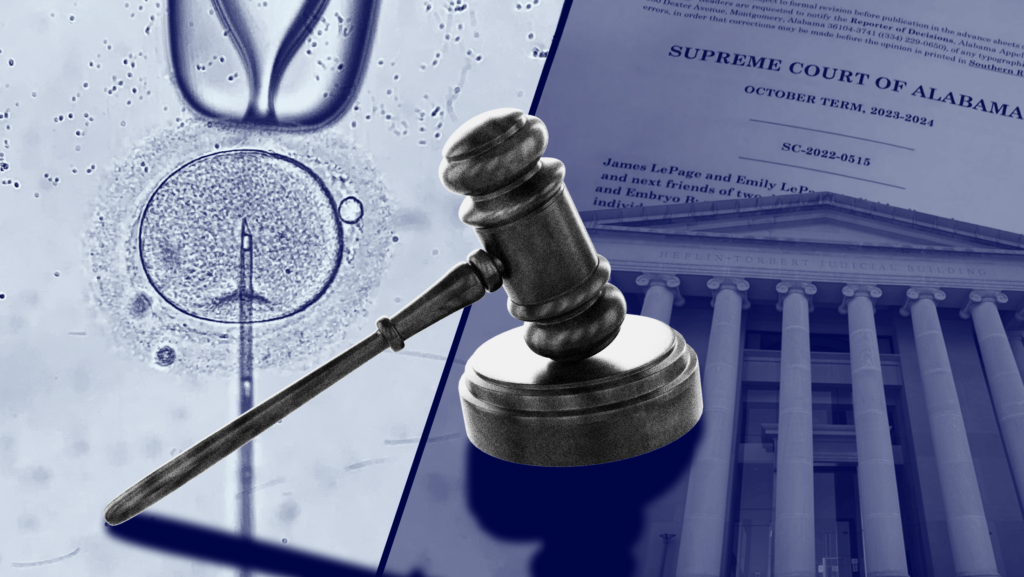Alabama’s IVF Ruling Is Exactly What Conservatives Have Been Promising for Years

Since Dobbs, abortion has been a losing issue for conservatives. Citizens in state after state have affirmed that they don’t want the government in their bedrooms or making decisions about their bodies. Still, the elected justices of the Alabama Supreme Court saw an opportunity to take the next step in their crusade for fetal personhood ruling that embryos are entitled to the same legal protections as a minor child. The ruling has imperiled in vitro fertilization (IVF) throughout the state of Alabama, leaving families struggling with fertility no place to turn — including conservative Christian families across the state.
That we got to this point so quickly after Roe v. Wade was demolished should surprise no one. This was always the plan.
Look at the nomination and confirmation of Sarah Pitlyk, now a federal judge in Missouri. Pitlyk had claimed that fertility treatments like IVF and surrogacy have “grave effects on society, including diminished respect for motherhood and the unique mother-child bond; exploitation of women; commodification of gestation and of children themselves; and weakening of appropriate social mores against eugenic abortion.”
She had built her whole career opposing reproductive freedom. That’s why then-President Donald Trump nominated her to be a judge, and why almost every Republican senator voted for her confirmation in 2019. Meanwhile, 125 of their Republican House colleagues, including Speaker Mike Johnson (La.), have supported the Life at Conception Act, a bill that would define human life at fertilization, just as the Alabama Supreme Court ruled. Some of those same lawmakers are unconvincingly claiming to object to that ruling.
In other words, while Alabama was the first mover against IVF, there are plenty of Republican-supported federal judges ready to follow suit with political support at their backs. And as we know from federal district judge Matthew Kacsmaryk’s mifepristone case in Texas, one conservative judge in one judicial district can imperil reproductive freedom across the nation.
Still, for all of its parallels to other anti-choice decisions, Alabama’s ruling was not a run-of-the-mill anti-choice opinion. In his special concurrence, Alabama Chief Justice Tom Parker spelled out his understanding that the court and the Republican-controlled Legislature were adopting a Christian-based view of personhood: “that even before birth, all human beings bear the image of God, and their lives cannot be destroyed without effacing his glory.”
We’ve never seen such baldly religious talk in a modern judicial opinion. Indeed, Parker’s remarks were so grotesquely religious that advocates might well be empowered to challenge the ruling at the U.S. Supreme Court, arguing that Parker and his colleagues have established Christianity as the state religion.
In normal circumstances, such an appeal would bring a sigh of relief. That is until you remember that six of the justices recently overturned a 49-year precedent on spurious legal grounds to achieve their preferred result. Among them was Justice Amy Coney Barrett, who refused at her confirmation hearing to answer a direct question about whether she’d support the criminalization of IVF (again, every single Republican senator voted for her confirmation).
Not every conservative will openly admit like Parker that they want to force their specific beliefs on all other people. But it’s very clear what their agenda spells out. And now that their cards are on the table, what are we going to do about it?
In case after case, these monumentally consequential decisions are reminding us just how vital it is to invest in who serves on our courts. At the federal level, the president appoints and senators confirm judges. In the states, the processes vary from governor appointments to direct elections of state Supreme Court justices, such as in Alabama.
We not only have a say in who sits on our courts, but also a civic duty to take that responsibility seriously. From the lives endangered by those who can’t access abortion care to the families now struggling to conceive, we must take that responsibility seriously.
Rakim Brooks is a public interest appellate lawyer and the president of Alliance for Justice. As a contributor to Democracy Docket, Brooks writes about issues relating to our state and federal courts as well as reforms to our judicial systems.